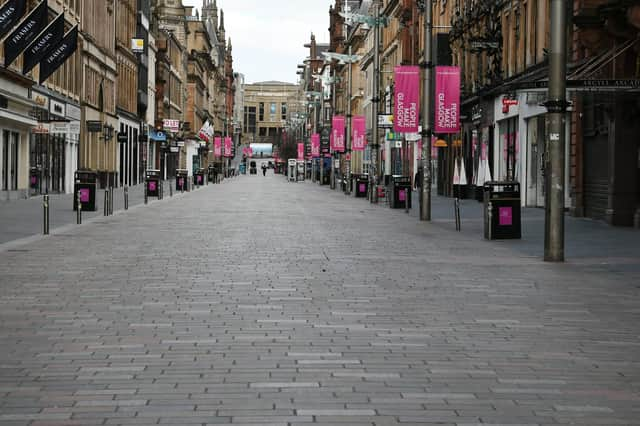Collaboration key to ensuring retail has a future - comment


As we emerge from the Covid-19 lockdown and the country moves into the “new normal,” it’s vital that the economic importance of Scotland’s retail sector isn’t underestimated. Rejuvenating our retail and leisure sector should be a priority to help get over the effects of the pandemic. To succeed, a collaborative approach is required involving landlords, tenants and government – UK, Scottish and local.
It will be a challenge for retailers to be profitable again, with footfall expected to remain low as consumers take time to regain confidence. There will be continuing pressure on the sector from landlords looking to safeguard their revenue flows and we know that more company voluntary arrangements (CVAs) are looming.
Advertisement
Hide AdAdvertisement
Hide AdWe must try to get through the current situation with as few corporate casualties as possible. Even before coronavirus, the outlook for retail was gloomy, with falling footfall, a shift to online shopping, and Brexit uncertainty. Such pressures were leading to a stream of CVAs.


Our Midsummer Retail Report 2019 concluded that “after an unprecedented year of turmoil, the UK retail sector, and the property market that it supports, is having to reinvent itself”.
However, before Covid-19, Glasgow and Edinburgh were performing strongly. As a result of the pandemic, Zone A rates in Scotland’s largest cities will be hit hard, with Buchanan Street in Glasgow, Scotland’s best shopping street, likely to come under downward rental pressure, something that would have been unheard of only 12 months ago.
In Edinburgh, Ocean Terminal has been suffering because of such factors as the strength of Fort Kinnaird to the south-east of the city and the ongoing redevelopment of Edinburgh St James, which is attracting such names as Bershka, Pull & Bear and Zara – all Inditex brands.
Interesting model
Now Ocean Terminal is no longer destined to become an outlet mall, but a mixed-use development that will include residential, office and amenity space. This will be an interesting model to watch in terms of how other centres might reinvent themselves.
The pandemic has, in effect, brought forward by three to four years what was already a gradual decline in the retail market. The UK retail landscape has already changed forever, with a move towards more European-style based leases, where rent is dictated by a store’s turnover and shorter lease lengths providing tenants with greater flexibility.
This model has been scarce in Scotland but could be fundamental to a sound future, forcing closer relationships between retailers and landlords.But some landlords are reluctant to change current lease models, with Colliers’ research suggesting that only 40 per cent believe trade and footfall data will drive future rents. A more collaborative approach is needed with everyone doing their level best to keep stores open.
Leisure is facing an even tougher future than retail. It has been the hardest hit and will find it the most difficult to come back. Many operators, including local pubs, will simply not be reopening.
Advertisement
Hide AdAdvertisement
Hide AdMore than 240,000 people work in retail in Scotland. If you add in the leisure and hospitality sector, the number is on a par with those employed in health and social work. With so many individuals relying on the retail sector it would be wrong of the government not to look at far-reaching ways to support it.
To reinvigorate the sector, a range of initiatives is required and collaboration is vital. The historic rateable value system that puts a major burden on retailers must be overhauled. A level playing field on tax has to be created between physical and online retailers. Major structural changes are required to the rates system as a matter of urgency.
We should build on the trend to shop locally that has emerged during the pandemic and recognise the importance of the SME sector by developing appropriate policies. However, such policies must be implemented, rather than left on the shelf.
Retailers must make shopping more of an experience and show they are putting people’s health and safety first. They can’t just offer the same as they did pre-Covid if consumers are to return from internet shopping.
Out-of-town shopping centres are struggling more than ever. Intu, which owns a number of centres, including Braehead, has warned that its financial challenges could see entire sites shut down.
A strong retail provision is vital to the prosperity of all cities and towns, and it needs support from the Scottish Government. One option could be to establish a specific government role covering retail, leisure and the licensed trade. The retail and leisure landscape is being changed forever and if anything good is to emerge, the sector and government must work together.
A message from the Editor:
Thank you for reading this story on our website. While I have your attention, I also have an important request to make of you.
The dramatic events of 2020 are having a major impact on many of our advertisers - and consequently the revenue we receive. We are now more reliant than ever on you taking out a digital subscription to support our journalism.
Advertisement
Hide AdAdvertisement
Hide AdSubscribe to scotsman.com and enjoy unlimited access to Scottish news and information online and on our app. Visit https://www.scotsman.com/subscriptions now to sign up.
By supporting us, we are able to support you in providing trusted, fact-checked content for this website.
Joy Yates
Editorial Director
Comments
Want to join the conversation? Please or to comment on this article.